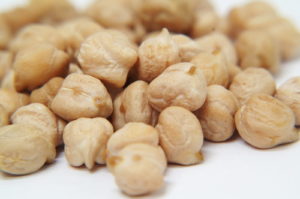To begin, let’s start with two slices of 100% whole wheat toast. This bread is loaded with bran, germ, and endosperm. The bran provides B vitamins, as well as iron, copper, zinc, magnesium, and antioxidants, which keep unwanted free radicals at bay. They destroy your body’s healthy cells, so free radicals are substances that your body can definitely do without. As free radicals increase in your system, you increase the risk of acquiring a variety of different diseases, including cancer. In short, antioxidants fight these free radicals to keep your body healthy. In general, we can say that they are a great and needed requirement in keeping your immune system strong.
For a spread, let’s not add butter, margarine or cream cheese. Instead, how about some dark chocolate hummus! Yes, dark chocolate hummus. It is said that middle-eastern food contains some of the healthiest foods and hummus is one of the best middle-eastern foods you can consume.
Can’t Go Wrong with Hummus

Hummus is made up of chickpeas, which is rich in many nutrients; such as, iron, which keeps your blood healthy. If you don’t have enough of this nutrient, then your body won’t be able to create the healthy red blood cells it needs. Folate decreases the risk of birth defects and helps to reduce depression. Phosphorus keeps your bones strong and improves digestion.
Chickpeas also contain B vitamins, together, they are known as the Vitamin B Complex, which allows us to stay energized, promotes healthy skin and helps avoid memory loss. Then there is protein, an ingredient that most of us are familiar with. It’s called a macronutrient – a requirement that our body stores a large amount of it. Protein also assists in maintaining strong bones and builds muscle. It is also a building block for our skin and blood. Hummus also contains fiber, a super nutrient for your digestive system and helps to lower cholesterol levels.
Dark Chocolate – A Chocolate Lover’s Health Dream!
Add dark chocolate as a bread spread (you can get hummus dark chocolate at a variety of supermarket chain stores). The seeds from the cocoa tree are extremely rich in antioxidants. Dark chocolate, called the antioxidant superfood is also beneficial for blood pressure, the heart and helps towards cancer prevention. And believe it or not, dark chocolate is actually good for your oral health!
Beets Addition
If all these healthy nutrients and antioxidants are not enough to put on your bread, how about adding some beet and roasted garlic dip to your hummus sandwich? Beets supply vitamin C, fiber and potassium to your body and garlic is a great addition to your overall health. Just to name a few benefits, garlic is considered a heart-healthy food as it helps to lower your blood pressure and cholesterol levels. And garlic also contains antioxidants.
Whole wheat bread with dark chocolate hummus, beets, and garlic! Now, this is what I call a healthy sandwich and it is not even the main course!
An Egg Omelet a Day!

Now, to the entree of breakfast health. Do you like omelets? Most omelets contain some amount of eggs as one of their major ingredients, so let’s delve into the benefits of eating eggs. In a nutshell, eggs increase the good cholesterol (HDL), they reduce the risk of type 2 diabetes, reduces blood pressure and helps to maintain good eye health, but the bulk of the nutrition is in the egg whites, which contain protein, sodium, calcium, magnesium, phosphorus, and potassium. Consumption of potassium is very good for the heart and blood pressure, as well as helps relieve anxiety.
Let’s not stop with just an egg omelet. How about one rich in healthy vegetables; such as spinach? Spinach contains generous amounts of antioxidants. It also contains vitamins A, another free-radical fighter, but spinach also plays an important role in the maintenance of the heart, lungs, and kidneys. Spinach has vitamin B2 and vitamin C, rich in antioxidants and helps to strengthen the immune system, but most importantly, it also contains vitamin C, which is a super nutrient for bone health. The vitamin K* in spinach contains magnesium, manganese, folate, iron, calcium, and potassium.
Add an assortment of mushrooms, which decreases the risk of obesity, diabetes and heart disease.
Kale – A Super Veggie

Saving the best breakfast ingredient for last – kale (and doesn’t only have to be for breakfast). A super veggie that contains a huge amount of vitamin A, which maintains healthy vision, neurological functionality, healthy skin and a ton of antioxidants. Kalea also contains vitamin K, vitamin C, vitamin B6, manganese, calcium, copper, potassium, and magnesium. We have already spoken about the benefits of vitamin C. Vitamin B6 helps maintain a healthy nervous system. Manganese supports bone health and helps prevent Osteoporosis. Calcium, also a great bone benefactor and studies have shown that most people do not get enough of it. Copper is a brain stimulant and helps cure Arthritis. Magnesium assists in the prevention of migraine headaches and is also an anxiety reducer.
Now let’s discuss vitamin K. Studies have shown that this nutrient helps brain functions, bone health, assists in the reduction of blood pressure and is excellent in preventing blood clotting. Don’t leave your home without it!
Add some potatoes and a little bit of tasty melted cheese. Most cheeses contain an assortment of nutrients; such as calcium. Cheeses also contain protein, phosphorus, zinc, vitamin A and vitamin B12.
To wash it down, gobble down some 100% fresh-squeezed orange juice. I like it with pulp. When the pulp is there, you know you are getting it fresh-squeezed. You will benefit from high levels of vitamin C and vitamin D. Both vitamins are essential for your daily health!
* Those who are taking blood thinners or other medications might want to consult with a doctor prior to consuming foods that contain vitamin K.
Eat Your Fruits and Veggies

A side dish of your favorite fruits is highly recommended. How about some blueberries, which supports the skin, heart, fights cancer and provides more antioxidants to your body; strawberries, another cancer fighter, support the eyes and regulates blood pressure; grapes, the fiber, and potassium support your heart; and cantaloupe, which contains potassium, vitamins B1, B3, B6, and folate, as well as vitamin K, magnesium, and fiber. Place it over cottage cheese for a healthy antioxidant super fruit combination. Yummy.
Coffee – The Most Misunderstood Drink for Your Health

Your breakfast would not be complete without brewing a nice hot cup of coffee. Yes, coffee, one of the most misunderstood drinks when it comes to the subject of health.
Just for starters, coffee can help reduce the potential of acquiring dementia and subsequently, Alzheimer’s Disease. It also protects against Parkinson’s Disease – the second most common neurodegenerative disease and its caffeine inducer also assists in strengthening the liver. Coffee is a benefactor in lowering the risk of Type II Diabetes. If that’s not enough to get your blood warming for coffee, it helps to burn fat and increases energy levels, due to the caffeine. Some of coffee’s nutrients are Riboflavin (Vitamin B2): Pantothenic Acid (Vitamin B5), Manganese, Potassium, Magnesium, and Niacin (B3).
But coffee is not without some downfalls; however, we believe the advantages far outweigh the disadvantages.
While your heart and bones are loving every minute of your nutritious breakfast, there is one more healthy liquid that you should drink besides juice and coffee. And that is the most natural ingredient your body will ever need. H20, otherwise, known as water! Drink an abundance of water, not just at breakfast time, but throughout the day. You can’t go wrong with water and you can’t go without it!
Whether you are cooking breakfast in your own kitchen or going to the local diner or restaurant, be sure to order these antioxidant fighters of diseases and have peace of mind that the vitamins and nutrients in a complete breakfast like this will be the start of a great day!


